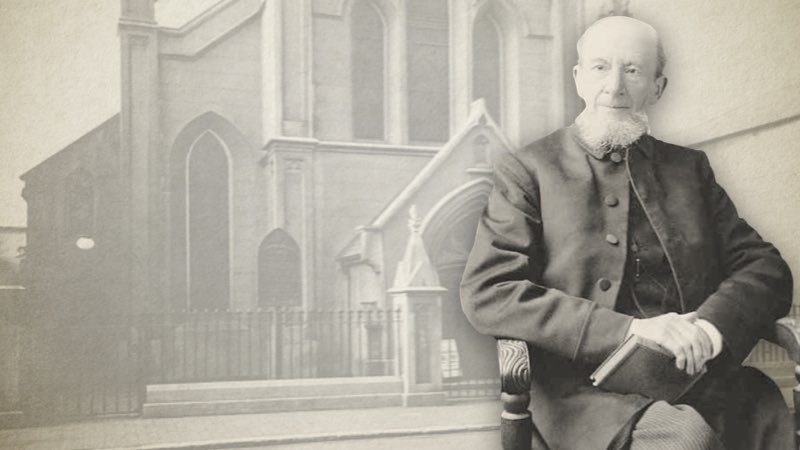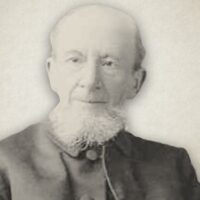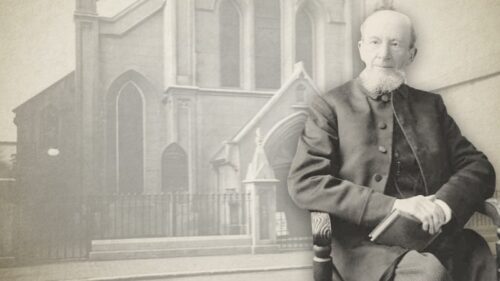
The Life And Ministry Of Andrew Baxter
John E. Hazelton, Hold Fast:
”John Grace’s successor was a man of weight and power, Andrew Joseph Baxter, who was born in Clerkenwell in 1832, and in his youth learned the art of engraving; working at the business of his uncle, he attained such a degree of proficiency that some of his productions were shown at the great Exhibition of 1852. The circumstances under which he was led to the ministry are referred to in his work, “The Great Phantom of the Age,” a book of 400 pages, written in the form of an allegory and containing some autobiographical passages well worthy of attention. When under spiritual concern, the first beam of hope shone into his mind through reading Joseph Hart’s hymns, placed in his hands by his grandfather, who for twenty-one years had worshipped with William Huntington’s congregation. He ultimately became a member of Richard Luckin’s Church at Woodbridge Chapel, Clerkenwell, where he first spoke in public and whence he went out to preach.
Mr. Baxter held fast to the doctrines of sovereign and distinguishing grace and soon displayed power as a preacher. Ten years of his ministerial life were spent at Sion Chapel, Nottingham, where he had in his Church the gifted and gracious Ruth Bryan, whose “Diaries” and “Letters” have been made a blessing to many. Deaths among his friends there induced him to seek another sphere of labour, and he accepted the invitation to Eastbourne in 1867. The Independent Chapel in Cavendish Place in that town was erected in 1857, and enlarged in 1868.
He could read the Scriptures in Hebrew, Chaldee, and Greek, and his memory was remarkably retentive. Not only could he repeat many of the Psalms by heart but he could recite whole chapters of the Bible. As editor of “The Gospel Advocate,” he displayed self-abnegation which is only too rare. Instead of appropriating the profits to his own use, he devoted them to a fund for the relief of aged ministers and their widows; and he was able to raise for this purpose no less than £6,000. Mr. Baxter compiled a hymn-book in which several of his own compositions are included.
Throughout his forty years’ ministry at Eastbourne his services were in much request throughout Sussex; and in other parts of England and in Scotland his testimony was gladly received. Littleport and Grantham, where he took up the periodical services of George Abrahams and John Grace, were regularly visited for many years, and at the Surrey Tabernacle, during James Wells’ last illness, his ministry was most acceptable. He frequently lamented the forgetfulness and unfaithfulness of those who under-valued the blessings of the Reformation and the discriminating and establishing truths of Holy Scripture. In maintaining these he exhibited, as in all things, firmness and decision of character, and by his eloquent and instructive sermons, which were at the same time practical and experimental, he was made widely useful in his day and generation. At Protestant meetings he was a frequent and welcome speaker.
His last sermons were preached in his own Chapel on Lord’s Day, July 7th, 1907. For two years some failure of strength had been apparent, but his weakness gradually increased, and the conclusion that his public ministry had closed was arrived at by all his friends, and acquiesced in by himself. The last entries in his diary for 1907 testify to his faith and love—”A year of tribulation,” “A year of special mercies,” “Make haste, my Beloved,” “Come, Lord Jesus, come quickly,” “Thy Church and those dear to Me, I commit to Thy guardian and providing Covenant care.” Those who were favoured to visit the sick room left with their faith confirmed and their hearts strengthened in the Gospel of God. He delighted in Cowper’s beautiful hymn:
“To Jesus, the Crown of my hope,
My soul is in haste to be gone,
Oh bear me, ye cherubim, up,
And waft me away to His throne.”
On Lord’s Days, and especially whilst service was being conducted in the adjoining Chapel, he had many precious seasons: “I have been very near heaven this morning,” he said to a friend who called after service. On February 29th, he entered into the joy of his Lord. The funeral took place on Friday, March 6th; a service at the Chapel was largely attended, and many gathered around the grave. “I loved him in life, and I love him none the less in death; for what I loved in him is not dead.”
“The saints of God, their wanderings done,
No more their weary course they run,
No more they faint, no more they fall,
No foes oppress, no fears appal:
Oh happy saints: for ever blest,
In that dear Home, how sweet your rest!”
These faithful men felt what is expressed in 1 Thess. 2:4: “But as we were allowed of God to be put in trust with the Gospel, even so we speak; not as pleasing men, but God, which trieth our hearts.” In not a few of the pulpits they once occupied, God’s servants still minister; but alas! looking around, the “falling away” is painfully apparent; “nevertheless the counsel of the Lord, that shall stand” (Prov. 19:21).
Joseph Irons’ version of Psalm 12 contains verses appropriate indeed:—
“Help, Lord, Thy Church is in distress,
Her faithful watchmen fail;
How scarce is vital godliness,
How heresies prevail.
Thus saith the Lord, I will arise
To vindicate My Word;
For I have heard My people’s cries,
And help I will afford.
‘Midst faithless men our faithful God,
Whose Word of grace is pure,
Performs His purpose with His nod,
For His decrees are sure.”
Andrew Joseph Baxter (1834-1908) was an Independent sovereign grace preacher, writer and hymnologist. In 1867, he was appointed successor to John Grace by the church meeting at Cavendish Place Chapel, Eastbourne, a position he held for forty years. He also served as editor of the Gospel Advocate.




